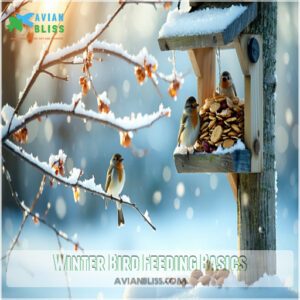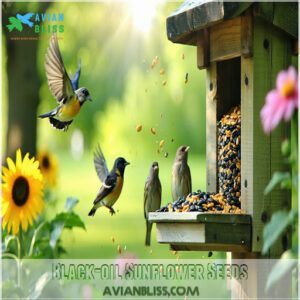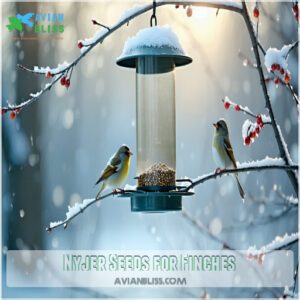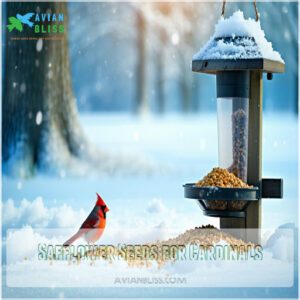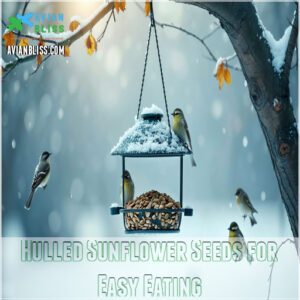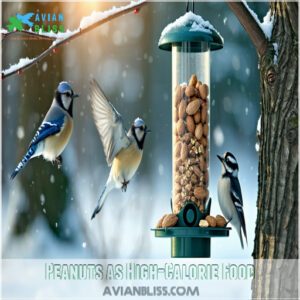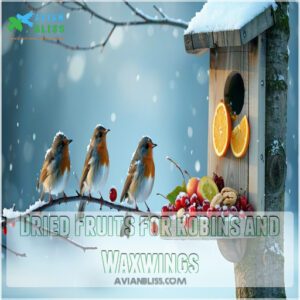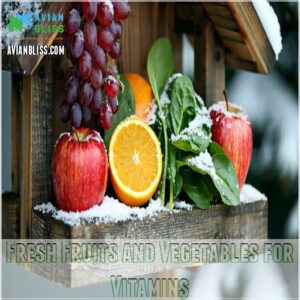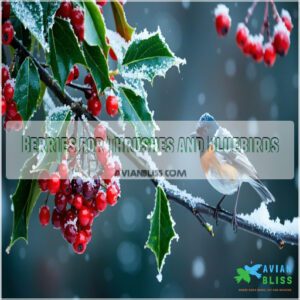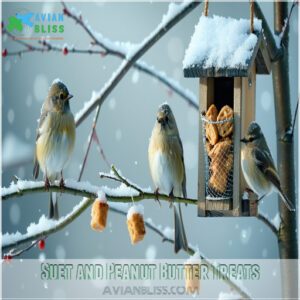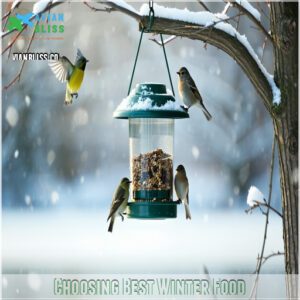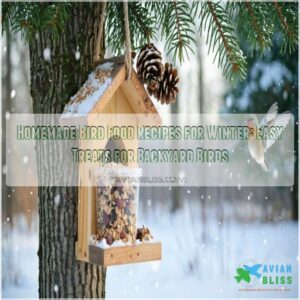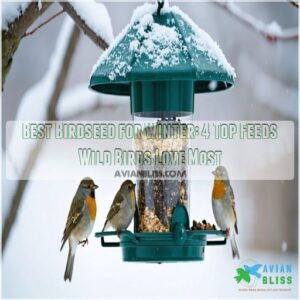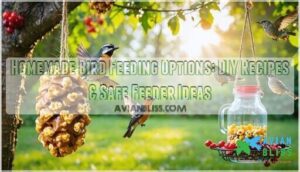This site is supported by our readers. We may earn a commission, at no cost to you, if you purchase through links.
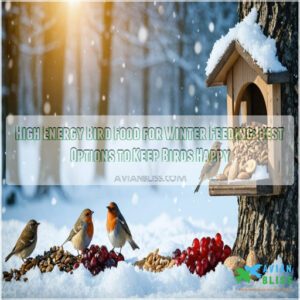
Seeds like black oil sunflower, safflower, and nyjer are calorie-packed favorites, giving birds the boost they need to stay warm.
Suet and peanut butter are like bird comfort food—loaded with fat for quick energy on frosty days.
Toss in peanuts and dried fruits, like raisins or cranberries, for a protein-vitamin combo that birds love, especially robins and waxwings.
Don’t forget variety; fresh, clean options keep your feathered friends happy and healthy.
It’s like running a bird café—serve the good stuff, and the crowd will flock.
Curious? Keep exploring!
Table Of Contents
- Key Takeaways
- Winter Bird Feeding Basics
- High Energy Seed Options
- Nut and Fruit-Based Foods
- Suet and Peanut Butter Treats
- Choosing Best Winter Food
- Frequently Asked Questions (FAQs)
- What is the best thing to feed birds in the winter?
- Is high energy suet good for birds?
- Do birds eat thistle seeds in the winter?
- Do birds like bird feeders in winter?
- How can I prevent mold in bird feeders?
- What time of day is best for feeding?
- How far should feeders be from predators?
- Can birds become dependent on supplemental feeding?
- How to safely clean and maintain feeders?
- Conclusion
Key Takeaways
- Offer high-energy foods like black oil sunflower seeds, suet, and peanut butter to keep birds warm and energized.
- Mix in raisins, dried fruits, and peanuts to provide a variety of nutrients and attract different bird species.
- Keep feeders clean and dry to prevent mold, and place them at least 10 feet away from predator hiding spots.
- Stock your feeders early in the morning, when birds are hungriest, and refill midday for an extra energy boost.
Winter Bird Feeding Basics
When winter hits, birds need all the help they can get to stay warm and fed, since snow and ice make finding food tough.
Putting out high-energy snacks like seeds, nuts, and suet can keep them happy, healthy, and fluttering around your yard all season long.
Importance of Supplemental Food
When winter hits, natural food vanishes fast, leaving birds scrambling for energy-rich options.
That’s where you step in! Offering high-energy bird food like black oil sunflower seeds or suet keeps them fueled for survival.
A supplemental diet fills the gap when food scarcity strikes, giving them a fighting chance, think of it as a bird-sized lifeline during harsh winters.
Challenges Faced by Birds in Winter
Freezing temps and food scarcity make life tough for birds in cold climates.
They’re burning energy like crazy just to stay warm.
Short days limit foraging, making winter bird food essential for survival.
Understanding bird winter survival is vital for their well-being.
Here’s what they face:
- Metabolism skyrockets in harsh weather.
- Food vanishes fast.
- Predators lurk everywhere.
- Hypothermia risks are constant.
- Longer migrations drain reserves.
Role of High-Energy Foods
Cold days mean birds burn calories fast, so they depend on energy-rich bird food to survive.
High energy bird food like suet and high fat bird food boosts their strength, while seeds and nuts cover winter bird nutrition needs.
| Food Type | Benefits | Examples |
|---|---|---|
| Fat Supplements | Quick energy boost | Suet, Peanut Butter |
| High-Calorie Seed | Long-lasting calorie intake | Black Oil Sunflower Seeds |
| Dried Fruits | Vitamins for bird wellness | Raisins, Cranberries |
High Energy Seed Options
When it’s freezing outside, birds need high-energy seeds to stay warm and active, so offering the right mix is a win-win for them and your backyard.
Seeds like black oil sunflower, safflower, and Nyjer pack plenty of energy as well as attract a colorful variety of feathered friends.
Black Oil Sunflower Seeds
Black oil sunflower seeds are like a bird buffet—they’re small, easy to crack, and packed with energy-rich bird food.
Their high calorie content makes them perfect for winter bird feeding, keeping feathered friends fueled.
You can find a variety of black oil sunflower seed products for your needs.
Use tube, hopper, or platform feeders for flexibility in how you offer the seeds to the birds.
For wild bird nutrition and seed storage, keep them fresh, dry, and safe from pests to ensure the birds get the most out of the seeds.
Nyjer Seeds for Finches
If sunflower seeds are the life of the party, Nyjer seeds are the VIP lounge for finches.
This tiny, oil-rich, energy-packed seed keeps finches singing through cold months.
Another excellent high-energy option is oil sunflower seeds, which provide essential calories for winter survival.
- Finch Nutrition: Packed with fat and protein.
- Nyjer Benefits: Appeals to goldfinches, sparrows.
- Seed Storage: Keep fresh; spoils fast.
- Finch Behavior: Watch playful feeding dances.
- Nyjer Thistle Seed Feeders: Perfect for winter fuel!
Safflower Seeds for Cardinals
Safflower seeds are a superstar for cardinals, adding a punch of energy to their winter diet.
These seeds are packed with protein and fat, ideal for cold months when food runs scarce.
Plus, pesky squirrels tend to steer clear of them.
You can find a variety of safflower seed cardinal products online.
To attract these red beauties, sprinkle safflower seeds on your platform feeder and watch their vibrant feathers brighten a winter day, with safflower seeds being the key to it all.
Hulled Sunflower Seeds for Easy Eating
Ever wonder why hulled sunflower seeds are a winter favorite?
They’re like fast food for birds—easy to eat and packed with energy!
For the best deals, consider exploring bulk buying options for sunflower seeds.
This energy-rich bird food is ideal for a winter diet, offering sunflower benefits without the mess.
Perfect for bird preferences like chickadees or titmice needing quick bites!
Nut and Fruit-Based Foods
In winter, nut and fruit-based foods are a powerhouse of energy that birds can’t resist, helping them stay warm and active.
From peanuts to berries, these treats are like comfort food for your feathered friends, giving them a tasty boost when they need it most, which can be considered comfort food.
Peanuts as High-Calorie Food
Peanuts pack a punch in the context of high-energy bird food.
They’re loaded with fat and protein, perfect for winter.
Birds love them, and they’re versatile too: You can find winter bird peanuts online.
- Whole peanuts: Great for jays and woodpeckers.
- Shelled peanuts: Easier for chickadees and titmice.
- Crushed peanuts: Attract smaller birds like wrens.
Offer them in tube or tray feeders for safe, calorie-rich feasting!
Dried Fruits for Robins and Waxwings
If peanuts aren’t a hit, dried fruit is a game-changer for winter feeding.
Robins and waxwings love dried berries, raisins, or even apple slices.
Consider supplementing with high quality bird food recipes for added nutrition.
Soak raisins or cranberries to soften them—birds adore the texture!
Waxwings are fruit fanatics, gobbling sugary treats for energy.
Offering these sweet snacks supports bird preferences for fruit nutrition during winter’s toughest moments.
Fresh Fruits and Vegetables for Vitamins
Fresh fruits and vegetables are like multivitamins for birds in winter, boosting their diet with natural sugars, fiber, and nutrients.
Apple slices and grapes are easy favorites, while leafy greens add balance.
Chop them up for smaller birds, and always check freshness.
Offering these treats keeps your backyard visitors happy and healthy when nature’s pantry slows down.
Berries for Thrushes and Bluebirds
Berries are like candy for thrushes and bluebirds, especially when winter foraging gets tough.
Packed with Berry Nutrition, they’re a natural high energy bird food that’s easy to provide.
Plant berry-producing shrubs like:
- Holly for vibrant red treats
- Serviceberry for Thrush Diets
- Dogwood for vivid Bluebird Preferences
- Elderberry for juicy Fruit Sources
- Juniper for hearty winter snacks
Suet and Peanut Butter Treats
When winter hits, suet and peanut butter treats are like energy-packed comfort food for birds.
They’re perfect for keeping your feathered friends warm and fueled, especially when natural food is hard to find.
Suet as High-Energy Food
Suet’s like a power bar for birds.
Its high fat content makes it the perfect energy source during winter.
Need something easy? Buy ready-made suet cakes, or whip up your own mix at home.
Woodpeckers, chickadees, and wrens will thank you for this winter survival snack.
Suet benefits include warmth and nutrition, keeping birds lively and fed in tough weather.
Cracked Peanuts for Woodpeckers
Woodpeckers are like gym-goers in winter—they need energy-rich bird food to fuel their busy tapping.
Cracked peanuts are a superstar in their diet, offering protein, healthy fats, and a tasty crunch.
Sprinkle them on platform feeders or mix with seed varieties for a treat.
These high-calorie birdseed options keep clinging birds like woodpeckers happy, energized, and ready to show off their tree-pecking skills!
Peanut Butter for Nuthatches and Chickadees
If cracked peanuts bring woodpeckers to the yard, peanut butter is like an energy-packed magnet for nuthatches and chickadees.
Spread it thin on tree bark or a pinecone, and watch them fuel up on this energy-rich bird food.
Peanut Butter Benefits? It’s loaded with fats and proteins, perfect for winter wild bird care.
Easy, fun, and effective! Using the right homemade bird food recipes can make a significant difference in the health and happiness of the birds visiting your yard.
Bark Butter for Clinging Birds
If peanut butter’s a hit with your backyard visitors, bark butter takes things up a notch.
Smear this spreadable suet on tree bark, and watch woodpeckers, chickadees, and nuthatches flock in for a feast.
Packed with energy-rich bird food, it’s perfect for winter cling feeding.
Bonus? You can whip up bark butter recipes at home, mixing peanut butter, cornmeal, and lard for happy, healthy birds.
Choosing Best Winter Food
When you’re choosing winter food for your feathered friends, think about energy-packed options like seeds, nuts, and suet to help them stay warm.
Keep it fresh and varied, because birds need both a balanced diet and a little excitement at the feeder!
Considering Bird Species and Climate
Paying attention to your region’s bird diversity and climate zones makes a big difference when choosing winter bird food.
Some birds migrate, while others tough out the cold, relying on high-calorie birdseed or energy-rich options like suet.
In colder zones, prioritize cold weather bird food for survival, while areas with milder winters may focus on seasonal food availability and geographic feeding habits, considering the importance of climate zones.
Balancing Carbohydrates, Proteins, and Fats
Birds need a balanced diet to thrive in winter. Macronutrient balance matters for survival.
Here’s the scoop:
- Carbs: Quick energy for cold days (think millet or cracked corn).
- Proteins: For growth and maintenance (try mealworms).
- Fats: Packed with calories for warmth (suet rocks!).
- Variety prevents boredom.
- Freshness guarantees safe, energy-rich food.
Keep them happy!
High-Demand Seeds and High-Fat Options
When it’s cold, birds love energy-rich bird food like black oil sunflower seeds and suet for birds.
These high-calorie birdseed choices pack the fat content they need.
Nyjer seed for finches is perfect for their picky preferences, while hulled sunflower seeds keep cleanup easy.
Offering these energy sources shows smarter seed selection for better winter nutrition and happy birds, which is made possible by choosing the right types of food like suet for birds.
Importance of Freshness and Variety
Switching up your winter bird food isn’t just thoughtful—it’s smart.
Birds get picky fast, and variety keeps them coming back.
Keep feeders full of high-energy food like fresh seeds and enticing fruits.
Rotate food types to match bird preferences.
Providing the best birdseed options is essential for their survival during harsh winter months.
- Check seed quality weekly to avoid mold.
- Rotate food offerings for nutrient balance.
- Maintain feeders for clean, safe dining.
Frequently Asked Questions (FAQs)
What is the best thing to feed birds in the winter?
When it’s freezing out, birds crave high-energy foods like suet, black-oil sunflower seeds, and peanuts.
Mix in some raisins or dried fruit for a treat, and you’ll have happy, feathered visitors all winter long.
Is high energy suet good for birds?
High-energy suet’s like a cozy blanket for birds in winter.
It fuels their tiny bodies with fat and warmth when food’s scarce.
Just hang it securely, away from predators, and watch them flock happily!
Do birds eat thistle seeds in the winter?
Yes, birds like goldfinches and pine siskins love thistle (nyjer) seeds in winter.
These tiny, oil-rich seeds provide much-needed energy.
Use a specialized feeder to keep seeds dry and stop them from blowing away!
Do birds like bird feeders in winter?
When winter hits like a freight train, birds love bird feeders.
They’re a buffet of energy-rich foods, helping them survive cold months.
Clean feeders, tasty seeds, and suet can turn your yard into bird paradise.
How can I prevent mold in bird feeders?
Keep feeders dry by using a weather guard and placing them in sheltered spots.
Shake out old seed daily, and clean feeders weekly with soapy water.
Mold-free food means happy, healthy birds in winter!
What time of day is best for feeding?
Think of breakfast as birds’ rush hour—early mornings are prime feeding time.
Birds are hungriest after cold nights, so stock your feeders at dawn.
Adding a midday refill boosts energy during winter’s chill.
How far should feeders be from predators?
Place feeders at least 10 feet from shrubs or trees where predators can hide.
It’s like giving birds a “safe zone” to spot danger.
Closer? They might feel like they’re in a horror movie.
Can birds become dependent on supplemental feeding?
Feeding birds is like offering a lifeline, not a leash.
They won’t depend on your feeders but appreciate the boost during tough winters.
Birds still scout for natural food, keeping their wild instincts sharp.
How to safely clean and maintain feeders?
Scrub feeders with hot soapy water, rinse thoroughly, and dry completely to avoid mold.
Use vinegar or bleach for stubborn grime—just rinse like crazy.
Clean weekly, more often in winter’s rain or snow.
Conclusion
Think of your yard as a fuel station for winter birds, keeping their engines running during chilly months.
By offering high energy bird food for winter feeding—like black oil sunflower seeds, suet, and peanut butter—you’re giving them the essential calories they need to survive.
Mix in fruits, nuts, and fresh options for variety, and you’ll attract a lively, grateful crowd.
Keep your feeders clean and stocked, and watch these feathered friends turn your yard into their favorite winter hangout, making it a winter hangout.
- https://www.audubon.org/news/top-10-foods-winter-bird-feeding
- https://www.birdsandblooms.com/birding/attracting-birds/feeding-birds/foods-birds-winter/
- https://www.wbu.com/the-best-foods-for-birds-during-winter/
- https://suetstore.com/products/high-energy-suet-12-pack
- https://www.heathmfg.com/collections/bird-food

